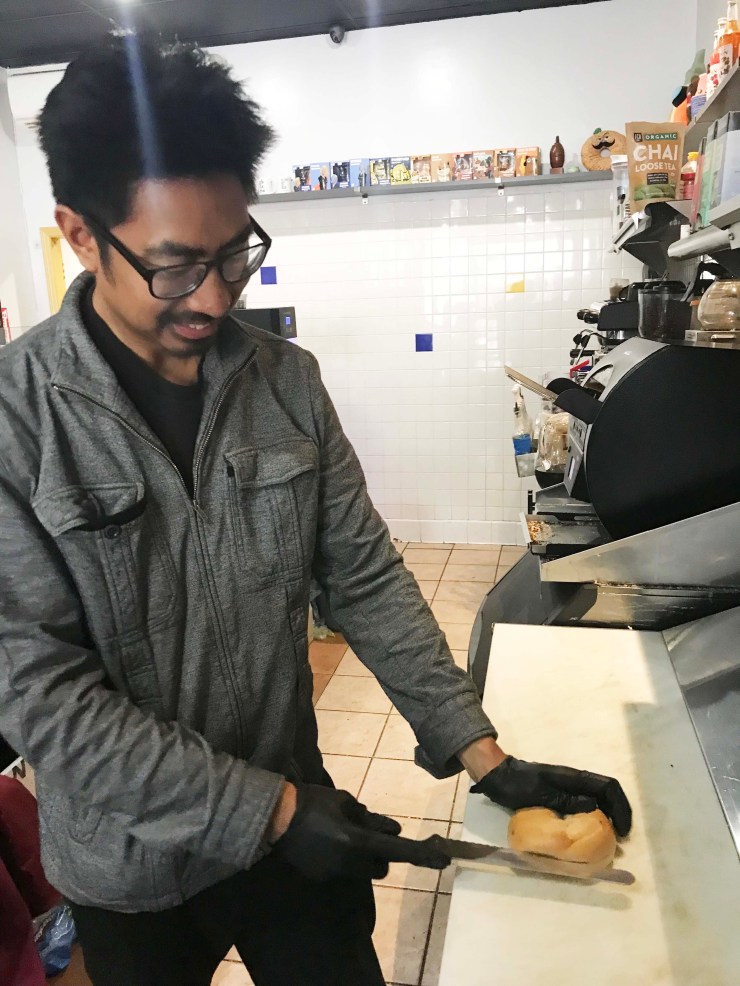Has the banking crisis been a boon for crypto?


The price of a single bitcoin has recently risen to nearly $29,000. It is close to double its value at the end of last year, which was not a very good year for crypto.
Remember that 2022 saw a number of major bankruptcies in the industry – especially for the exchange of FTX in November. But bitcoin and other digital currencies are riding a wave of momentum that started last month, around the time of Silicon Valley Bank’s collapse and the government’s response.
At The Bagel Exchange in Alhambra, California, one of the first things you see when you walk in is a machine that sells bitcoin and other cryptocurrencies.
Owner Ryan Natividad says you can pay for schmear with cash, credit or crypto — and not just bitcoin and the other majors.
“We accept Litecoin and Matic. Someone paid with Eightcoin the other day,” he said.
Natividad also has a giant stock ticker mounted on the wall, over four TV screens playing financial news and a live stream on Twitch.

Making a matcha green tea latte, Natividad said he paid for this place from his own crypto winnings and he’s sticking to it.
“I still believe in Bitcoin and Ethereum. I feel like it’s going to be around for a while,” Natividad said. “There’s a lot of bad news going on. Everyone just doesn’t know where to put their money.”
Bitcoin – the standard bearer of crypto – emerged from a period when bad economic news was the norm: the Great Recession. The cryptocurrency was created in January 2009 after a year of major financial failures.
This first wave of bank failures since then is a big test for crypto, said David Yermack, head of the finance department at New York University’s Stern School of Business.
“Many of the larger banks appear to be vulnerable. Governments have not been very successful in bailing them out and building public confidence, Yermack said. “This is exactly the kind of dynamic that the creators of Bitcoin were trying to tap into.”
And there is some validation in this moment, according to Sheila Warren, executive director of the industry group Crypto Council for Innovation.
“I think people really feel, ‘This is what we’ve been talking about for so long, guys, right?’ Look back at 2008 and 2009!’ And now we are here. So I think there’s a quiet kind of recognition of that,” she said.
At the same time, many crypto enthusiasts and investors are concerned that regulators are trying to prevent money from escaping the traditional banking system right now.
“There certainly seems to be a concerted effort to close the exit ramps — close the doors to crypto,” said entrepreneur Adam Jackson, founder of Cambrian Asset Management, a cryptocurrency hedge fund he launched in 2017.
Jackson points to the regulatory tightening that has intensified recently. Late last month, the world’s largest crypto exchange, Binance, was sued by the Commodities Futures Trading Commission for running an alleged fake compliance operation. And Coinbase said it was notified of potential charges by the US Securities and Exchange Commission.
This development has only contributed to the view held by some that the old guard of the financial system is coming after crypto.
People tend to look for information that confirms how they already see the world, said Hilary Allen, a professor at American University Washington College of Law.
“I could see how someone who would very much like to believe that crypto is the successor to traditional finance could interpret what has happened in the last few weeks as confirmation that crypto will take over,” Allen said.

But while the recent banking crisis has shown that there are definitely problems in traditional finance, “I think those problems are replicated and exacerbated in the cryptosystem,” Allen added.
Back at The Bagel Exchange, Ryan Natividad is having one of his regular chats about crypto with Richard Valenzuela, who owns the bar next door.
“I come in here to make fun of him all the time,” Valenzuela said.
Even after all their conversations, Valenzuela said crypto doesn’t make sense to him. “People are like, ‘Oh, maybe it’s worth something.’ But it’s like, how can something with no intrinsic value appreciate so much? I don’t understand that, Valenzuela said.
A lot of people don’t really understand that. But crypto seems to be on the rise anyway, as many wait to see what’s next for the technology and the larger economy.
There is a lot going on in the world. Through it all, Marketplace is here for you.
You trust Marketplace to break down world events and tell you how they affect you in a fact-based, accessible way. We depend on your financial support to continue to make it possible.
Your donation today powers the independent journalism you trust. For just $5 per month, you can help sustain the Marketplace so we can continue to report on the things that matter to you.
























